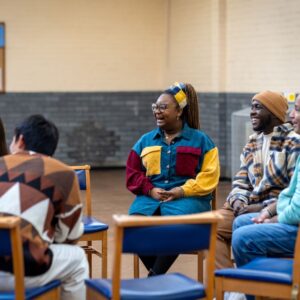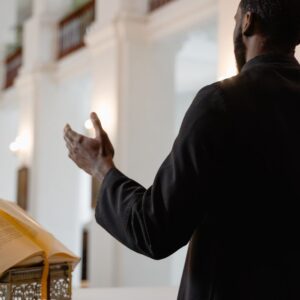Sarah Crass and the leadership team at Medical Teams International were at a crossroads. They had started getting input from across their non-profit in order to create a new strategic plan. But then they entered an unexpected season of leadership transition, including an interim CEO stepping in during a search for a new CEO.
They had two choices: either stop getting input for the strategic plan, and risk losing employee engagement and momentum, or continue investing staff time in creating the new plan and risk that a new CEO might dismiss the plan in favor of their own vision.
Investing in Employee Engagement
As Chief of Staff at the multinational NGO, Crass knows that leadership transitions are a critical time for employee engagement and retention. The team factored that need for engagement into their decision: they decided to diverge from traditional wisdom that says the best way forward under interim leadership is to maintain the status quo. Instead, they would continue to invest in a wide-and-deep employee input process to shape their new strategic vision. The positive ramifications of that choice led Crass to share some best practices for employee engagement and building strategic plans in times of leadership transitions.
Go Wide and Deep to Engage Employees in a Strategic Plan
Each of Medical Teams International’s nearly 4,000 employees across the globe were asked to participate in an after-action review on the previous strategic plan and in a SWOT (strengths, weaknesses, opportunities, threats) analysis. Then they formed more than 40 staff working groups around the globe and included people from every program and every department. These groups gave input on the non-profit’s distinctives, geographies, approaches, and barriers. Groups were intentionally small (6-10 people) so that they could have deep, facilitated conversations.The findings from those groups were brought to the larger program teams for validation and refinement.
“40 working groups takes a lot of staff time and attention,” Crass acknowledged. Through the process, Crass checked in with the participants to make sure it wasn’t too much alongside the other demands of humanitarian work. The response from participants was clear: “Don’t stop now. We’re having fun. We see results coming forward.”
This wide-and-deep process paid big dividends that made it worth it, though. As Crass said, “Staff were able to see their own contributions in the updated strategic plan. Staff are more confident in our forward direction because they were able to be part of that discernment.”
Employee Engagement Can Be Surprisingly Fun
“Designing wide engagement brought new voices to the table and highlighted how strong our ‘bench’ really is,” Crass said. “We were hearing voices that we hadn’t heard yet and having strategy conversations we hadn’t heard before. We started looking for who might be some of the emerging leaders and catalysts in the organization that might have flown under the radar before. New leaders emerged through this methodology, which was pretty great.”
Employee engagement and knowledge sharing are “not only valuable but also a lot of fun, and you see amazing sparks of connection and excitement coming out of your staff,” Crass shared. Inviting input also uncovers untapped potential. “You have people in your organization with their primary role and knowledge–but often there is a secondary knowledge that is untapped, and if you invite them to the table, that emerges.”
Measuring Employee Engagement in Times of Transition
Part of Medical Teams International’s best practices is an annual employee engagement survey. The timing of the last survey overlapped with the leadership transition announcements. The survey validated the leadership team’s concerns that staff were nervous about the changes and future direction of the organization.
However, Crass noted that a temperature-check survey 6 months later showed “significant improvements and positive feedback in employee engagement.” A big reason for the improvement was the wide-and-deep input process: “Staff tied the strategy work – in addition to focused attention on leadership communication – to the improvement.”
About Medical Teams International:
Medical Teams International is a faith-based, non-governmental organization that delivers life-saving medical care to people in crisis. Their international work includes refugee medical care, disaster response, and material and child health. In the United States they provide mobile health care clinics in both urban and rural areas. In 2023, Medical Teams International served over 4 million people in 27 different countries. This work is motivated by their desire to love like Jesus by boldly breaking barriers to health and restoring wholeness in a hurting world.
About Sarah Crass:
Sarah Crass (MPH, Maternal and Child Health/Health Education) is the Chief of Staff at Medical Teams International. She is a certified Knowledge Management Expert with 15 years of experience within international organizations. At Medical Teams International, Crass is responsible for managing the executive office; strategy management and annual planning; oversight of policy development; and leadership engagement.











0 Comments